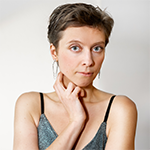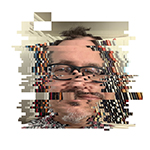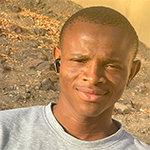Worship: The Gospel Of Pussy
Prologue: Listen.
The Pussy wants you to enter this deep dark tunnel,
Through which you pass To the Other side
In there You are held completely.
Then She wants Your Fire
Deep, Primordial Blazing up houses,
Swallowing everything The end
of all things. Complete Destruction
of what is holding you Back
and then Love.
Coming from your chest Powerful Mountain stream
River
Such a strong Current It takes everything
Your Heart pouring out Love
Tearing down Walls Flooding
All over.
Breathe in And Out.
Close your eyes.
Open your mouth.
Pussy is a Temple with Honey door.
You lick the door frame, You bite you eat, Honey
It is made of honeycomb And halva
it is made of Baklava
It is a big temple Of sweets and nuts
You can just go and Eat
And when you close Your eyes,
Warm Honey Is dripping On your eyelids.
You open Warm honey
Fills your Mouth.
That is Pussy She will feed you
Epilogue:
Worship in her.
Worship her.
In Liquid
Liquid is so important to me these days.
The slow flowing of water
The sounds that trickle through my toes.
I observe my body in the bathtub
and desire it intensely.
My softness. I can enjoy looking
and not need to be looked at.
I’m a sea creature,
watching Fran Lebowitz in my bath at midnight.
I feel ecstatic to be part of the same group of people.
The poetic world of the lesbian,
almost mythical creature to me.
I appreciate it all,
but I am especially delighted by the sensation in my mind of a woman so comfortable
in a suit.
Her shirt has shiny cufflinks on it
and they are quite big.
These women with swagger –
In some sort of imaginary mouth,
a transcendent sensual mind space
I enjoy chewing on the gestures, fabrics, and shapes of swagger.
The queer femininity is a fine smoke of a cigarillo
deeply and pleasantly inhaled, or the moment of coming with the dildo inside me,
on top of my lover with a tight touch.
Something ethereal
but still having
a wonderfully palpable texture.
Touch, taste, smell, emotion, feeling? They all combine into one.
The color of this bathwater is a soothing soft golden green,
transparent dress for my nakedness.
I turn around in it. My phone screen is fogging up.
The blue windows and yellow-orange lights,
my big city at night.
Surrounded by millions of people, but the street is empty.
Alone, but not lonely.
Held by the sensations,
filled with my experience,
a rhythm of breath.
The water soaks off layers of my past,
a new skin is emerging.
Can I slide and turn around this white tub with my wet slippery skin?
Soft joy and the hardness of the tub so good against it.
The neverending warmth of the water
enveloping me,
am I inside my own belly?
Pregnant with myself, a grown woman?
Or perhaps still waiting to be born?
My shape delights me and I can’t stop thinking about it.
Bathing in my desire.
When I touch my skin,
pale in the soft light of the LEDs from above the sink,
I am a mermaid in the city
and I only exist
for my very own eyes.
How will I sleep, when I am so hot?

Noemi is a queer, interdisciplinary artist from Slovenia, currently based in Berlin. She explores themes of embodiment, sapphic eroticism, LGBTQAI+ identities, and power dynamics. Her work has been showcased at the MSUM (Museum of Contemporary Art, Slovenia), the Humboldt Forum in Berlin, and many others. Noemi’s poetry and performance were published in Nothing Personal?! Essays on Affect, Gender, and Queerness (b_books, 2023) and her debut poetry collection is forthcoming with Black Box in Slovenia. Find more at noemivebericlevovnik.org, subscribe to her Substack at noemika.substack.com/, and explore the ruins of her online shop at noemika.com. You can also follow her current adventures (for now) on Instagram @noemkica.

 BACK TO ISSUE
BACK TO ISSUE




